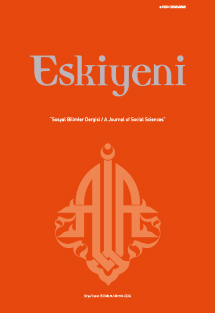Mu‘tezilî Perspektiften Nûh Kıssası: Cüşemî Örneği
The Story of Noah from a Muʿtazilite Perspective: In the Example of al-Jishumī
Author(s): Fatih PamukSubject(s): Theology and Religion, History of Islam, Qur’anic studies
Published by: Anadolu İlahiyat Akademisi
Keywords: History of Islamic sects; Kalâm; Prophet Noah; Qurʾān; Muʿtazila; al-Jishumī; Arguments of Reason and Revelation;
Summary/Abstract: Muʿtazila contributed significantly to the formation and development of Islamic thought and theology. However, for various reasons, the Muʿtazilite school has been weakened and access to the sources that convey their system of thought has become difficult. For this reason, the information about the Muʿtazilite thought was mostly evaluated through the information transmitted by their opponents. This led to the spread of demaging accusations against them that they prioritized reason to narration and abandoned narration which needed confirmation. In Muʿtazilite sources, on the other hand, it can be seen that they use narrated information, and even narrated information occupies an essential place in these works. It is understood that their adoption of a narrower approach compared to their opponents on some issues, such as intercession (shafaa’t) and the torment of the grave, was interpreted as a total denial of the relevant problems. In this regard, it is important to identify Muʿtazilite thought from its own sources. An important issue that needs to be addressed in this context is the determination of the Muʿtazilite school's approach to the Qurʾānic parables. Since the Qurʾānic parables, are usually ambiguous regarding events and persons, various narrations are cited from different sources to elaborate on the related narratives. The miraculous narratives in the Qurʾānic parables also allow for some rational inferences. The Muʿtazilite approach to Qurʾānic parables is closely related to their understanding of reason and narration. The narratives of the Prophet Noah and his people, which are among the parables of the Qurʾān, contain issues related to the basic principles of Muʿtazila, such as prophethood, denial, building an ark based on revelation, the flood, and the destruction of the people. For this reason, it would be helpful to examine the approach of Muʿtazilite thought to the parable of Noah in the example of al-Jishumī. The study, which uses the method of document and content analysis, analyses the approach of Muʿtazilite scholars to the parable of Noah and the impact of their theological thought on their approach to Qurʾānic parables through the source of al-Jishumī. As a result it's been determined that Muʿtazilite scholars attach importance to narrations and extract various evidences from Qurʾānic parables to support their sectarian principles and theories.The study, which uses the method of document and content analysis, analyses the approach of Mu'tazilite scholars to the parable of Noah and the impact of their theo-logical thought on their approach to Qur'anic parables. It's been observed that Mu'tazilite scholars attach importance to narrations and extract various evidences from Qur'anic parables to support their sectarian principles and theories.
Journal: Eskiyeni
- Issue Year: 2024
- Issue No: 52
- Page Range: 213-241
- Page Count: 29
- Language: Turkish

